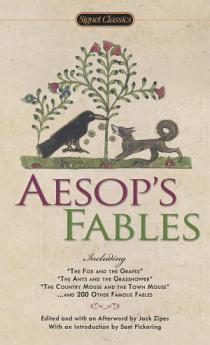Aesop's Fables
thg 3 2014 · Penguin
4,0star
3 bài đánh giáreport
Sách điện tử
304
Trang
family_home
Đủ điều kiện
info
reportĐiểm xếp hạng và bài đánh giá chưa được xác minh Tìm hiểu thêm
Giới thiệu về sách điện tử này
This exclusive Signet Classic edition contains 203 of Aesop’s most enduring and popular fables, translated into readable, modern American English and beautifully illustrated with classic woodcuts by the great French artist J. J. Grandville.
It is both amazing and wonderful that so much of the richness of our language and our moral education still owes a huge debt to a Greek slave who was executed more than two thousand years ago. Yet “sour grapes,” “crying ‘wolf,’” “actions speak louder than words,” “honesty is the best policy,” and literally hundreds of other metaphors, axioms, and ideas that are now woven into the very fabric of Western culture all came from Aesop’s Fables. An extraordinary storyteller who used cunning foxes, surly dogs, clever mice, fearsome lions, and foolish humans to describe the reality of a harsh world, Aesop created narratives that are appealing, funny, politically astute, and profoundly true. And Aesop’s truth—often summed up in the pithy “moral of the story”—retains an awesome power to affect us, reaching us through both our intellects and our hearts.
Including:
“The Fox and the Grapes”
“The Ants and the Grasshopper”
“The Country Mouse and the Town Mouse”
…and 200 Other Famous Fables
Edited and with an Afterword by Jack Zipes
With an Introduction by Sam Pickering
It is both amazing and wonderful that so much of the richness of our language and our moral education still owes a huge debt to a Greek slave who was executed more than two thousand years ago. Yet “sour grapes,” “crying ‘wolf,’” “actions speak louder than words,” “honesty is the best policy,” and literally hundreds of other metaphors, axioms, and ideas that are now woven into the very fabric of Western culture all came from Aesop’s Fables. An extraordinary storyteller who used cunning foxes, surly dogs, clever mice, fearsome lions, and foolish humans to describe the reality of a harsh world, Aesop created narratives that are appealing, funny, politically astute, and profoundly true. And Aesop’s truth—often summed up in the pithy “moral of the story”—retains an awesome power to affect us, reaching us through both our intellects and our hearts.
Including:
“The Fox and the Grapes”
“The Ants and the Grasshopper”
“The Country Mouse and the Town Mouse”
…and 200 Other Famous Fables
Edited and with an Afterword by Jack Zipes
With an Introduction by Sam Pickering
Xếp hạng và đánh giá
4,0
3 bài đánh giá
Giới thiệu tác giả
Aesop, according to various sources, was born in Phrygia, Lydia, Thrace, or Sardis, and lived from about 620 to 560 B.C. Little is known about his life, but Aristotle mentioned his acting as a public defender, and Plutarch numbered him as one of the “Seven Wise Men.” It is generally believed he was a slave, freed by his master because of his wit and wisdom. As Aesop became famous for his fables, which used animals as a code to tell the truth about political injustice, he incurred the wrath of the rulers, either in Athens or Delphi, and was executed. In about 300 B.C., Demetrius Phalereus of Athens made the first known collection of Aesop’s fables, which then spread far beyond the Greek world.
Jack Zipes is a professor of German at the University of Minnesota. He is the author of several books of fairy tales, including Breaking the Magic Spell and Don’t Bet on the Prince. He is also the editor of several volumes of fairy tales, including Beauties, Beasts and Enchantment: Classic French Fairy Tales, The Fairy Tales of Oscar Wilde, The Fairy Tales of Frank Stockton, and Arabian Nights.
Sam Pickering teaches English at the University of Connecticut. He has written more than two dozen books, including Waltzing the Magpies, an account of a year he and his family spent in Western Australia, and Dreamtime.
Jack Zipes is a professor of German at the University of Minnesota. He is the author of several books of fairy tales, including Breaking the Magic Spell and Don’t Bet on the Prince. He is also the editor of several volumes of fairy tales, including Beauties, Beasts and Enchantment: Classic French Fairy Tales, The Fairy Tales of Oscar Wilde, The Fairy Tales of Frank Stockton, and Arabian Nights.
Sam Pickering teaches English at the University of Connecticut. He has written more than two dozen books, including Waltzing the Magpies, an account of a year he and his family spent in Western Australia, and Dreamtime.
Xếp hạng sách điện tử này
Cho chúng tôi biết suy nghĩ của bạn.
Đọc thông tin
Điện thoại thông minh và máy tính bảng
Cài đặt ứng dụng Google Play Sách cho Android và iPad/iPhone. Ứng dụng sẽ tự động đồng bộ hóa với tài khoản của bạn và cho phép bạn đọc trực tuyến hoặc ngoại tuyến dù cho bạn ở đâu.
Máy tính xách tay và máy tính
Bạn có thể nghe các sách nói đã mua trên Google Play thông qua trình duyệt web trên máy tính.
Thiết bị đọc sách điện tử và các thiết bị khác
Để đọc trên thiết bị e-ink như máy đọc sách điện tử Kobo, bạn sẽ cần tải tệp xuống và chuyển tệp đó sang thiết bị của mình. Hãy làm theo hướng dẫn chi tiết trong Trung tâm trợ giúp để chuyển tệp sang máy đọc sách điện tử được hỗ trợ.








